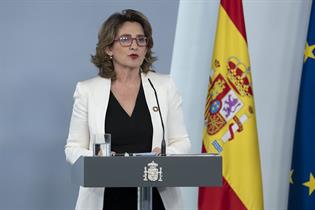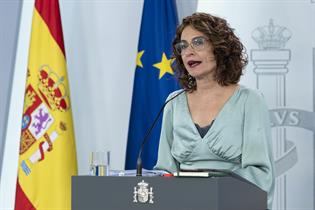Coronavirus COVID-19. Council of Ministers.
Government to request extension to state of emergency until 7 June and to activate guarantees for loans to SMEs and independent contractors for sum of 20 billion euros
Council of Ministers - 2020.5.19
Moncloa Palace, Madrid
The Council of Ministers agreed to ask the Lower House of Parliament for a new extension to the state of emergency until midnight on 7 June.
The Minister for the Treasury and Government Spokesperson, María Jesús Montero, called for the parliamentary forces to support Wednesday's proposal, which the President of the Government, Pedro Sánchez, will set out to them. María Jesús Montero claimed that the state of emergency is the only legal instrument that allows public mobility to be restricted - a key factor in "fighting the pandemic and saving lives".
The Minister for Health, Salvador Illa, spoke to the same end, stating that "the state of emergency is essential until the end of the de-escalation process, which will continue to be guided by prudence, caution and safety; each step we take must be a safe step".
 Pool Moncloa/Borja Puig de la BellacasaSalvador Illa explained that the text approved consolidates the principle of co-governance under which the de-escalation is being addressed and reduces the competent delegate authorities to just the Ministry of Health. It also repeals the Second Additional Provision of the Royal Decree of 14 March so that all procedural judicial terms and deadlines and the expiry of rights and actions will come back into effect as from 4 June. Administrative terms and deadlines will also come back into force as of 1 June.
Pool Moncloa/Borja Puig de la BellacasaSalvador Illa explained that the text approved consolidates the principle of co-governance under which the de-escalation is being addressed and reduces the competent delegate authorities to just the Ministry of Health. It also repeals the Second Additional Provision of the Royal Decree of 14 March so that all procedural judicial terms and deadlines and the expiry of rights and actions will come back into effect as from 4 June. Administrative terms and deadlines will also come back into force as of 1 June.
Compulsory use of face masks
The Minister for Health has confirmed that the use of face masks will be compulsory, not only on public transport as it has been to date, but in all closed spaces and in public spaces whenever the personal safety distance between people of two metres cannot be maintained. This was decided by the Technical Committee for the De-escalation following a meeting at the plenary session of the Inter-territorial Conference of the National Health System. The measures will come into force when the corresponding Order is published in the Official State Gazette, "possibly on Wednesday", said Salvador Illa.
Figures progressing favourably
Salvador Illa reviewed the latest figures on infection, which he described as "good", since the daily percentage increase does not exceed 0.5%, in line with the target set. However, he reiterated that we must continue to act with maximum individual responsibility and comply with the instructions and recommendations from the health authorities.
The minister announced that the applications from the regional governments and autonomous cities to change de-escalation phase have already been sent to the Ministry of Health and that bilateral meetings will be held on Wednesday and Thursday to analyse them from a technical perspective and agree to their terms, which will be published on Friday.
Climate change and energy transition
 Pool Moncloa/Borja Puig de la BellacasaThe government approved the Draft Climate Change and Energy Transition Act to be submitted to Parliament, with the aim of achieving carbon neutrality by 2050.
Pool Moncloa/Borja Puig de la BellacasaThe government approved the Draft Climate Change and Energy Transition Act to be submitted to Parliament, with the aim of achieving carbon neutrality by 2050.
María Jesús Montero highlighted that, in the government's opinion, the energy transition and the fight against the climate emergency are the two cornerstones on which the reconstruction of the country will revolve. She also welcomed the inclusion of this matter in the work plan of the Committee for Social and Economic Reconstruction after COVID-19, which has been set up in the Lower House of Parliament.
In the same vein, the Fourth Vice-President of the Government and Minister for Ecological Transition and Demographic Challenge, Teresa Ribera, argued that we cannot return to the previous model", but must promote a model of sustainable and inclusive development, that takes into account the most under-privileged, prevents any increase in inequalities, "creates decent jobs", modernises the economy and industry, make it healthier to live in cities, acknowledges the value of rural development and protects bio-diversity.
Targets for climate neutrality
The Fourth Vice-President of the Government explained that the text, in compliance with the Paris Agreement, and in line with scientific criteria and public demands, determines that Spain must achieve zero emissions by the year 2050, and that the electricity system must also be 100% renewable by that date.
Teresa Ribera pointed out that the draft law establishes that Spain must have reduced its greenhouse gas emissions by 20% on 1990 levels by the year 2030, "which in practice means reducing by one in every three tonnes that we currently emit", as contained in the National Integrated Energy and Climate Plan.
The text provides that 35% of final energy consumption, including all sources, must be renewable in origin, and that 70% of energy generated in the country must come from renewable sources. "With this target in mind, the deployment of clean energies will now be activated, which are the cheapest, simplest and most productive sources of energy, and which have an industrial value chain that is more interesting for our country", said the Fourth Vice-President of the Government
Teresa Ribera claimed that, by the year 2030, Spain will have significantly increased its energy efficiency, which will allow resources to be freed up to be employed in other public policies.
The government's aim, she maintained, is to reduce primary energy consumption by at least 35% thanks to energy efficiency measures, which will be particularly important in the construction sector.
Furthermore, the new legislation lays the foundations for sustainable mobility and establishes a framework so that the world of finance is looking towards sustainable investments. The aim, said Teresa Ribera, is "not to waste a single euro, and for each public or private investment decision to be projected in the right direction, mobilising the change and preventing money being thrown away".
The new legislation also introduces reporting obligations on the risk of climate change in regulated markets, credit institutions, insurance companies, and in financial and energy systems. It promotes the inclusion of environmental education in teaching curricula and commits to training in future jobs tied to a low carbon economy.
The mitigation of greenhouse gas emissions is addressed, specified Teresa Ribera, from a sector perspective, identifying key areas, such as hydrological and territorial areas, town planning, urban development, the construction of transport infrastructures, forestry and the conservation of bio-diversity.
The Fourth Vice-President of the Government called for the parliamentary groups to enrich the text in the passage of the new legislation through Parliament. "If we lay the foundations for a new model of prosperity that respects environmental limits and focuses on the well-being of people, then we will be able to provide quality, stable jobs in the economic and industrial system that are cutting edge and head up a low carbon economy".
Guarantees for loans to SMEs and independent contractors
 Pool MoncloaThe Council of Ministers approved an agreement to activate a new tranche of 20 billion euros under the Official Credit Institute (Spanish acronym: ICO) Guarantees for Lines of Credit wholly allocated to small- and medium-sized enterprises affected by the economic effects of COVID-19.
Pool MoncloaThe Council of Ministers approved an agreement to activate a new tranche of 20 billion euros under the Official Credit Institute (Spanish acronym: ICO) Guarantees for Lines of Credit wholly allocated to small- and medium-sized enterprises affected by the economic effects of COVID-19.
These guarantees cover 80% of the new loans and renewals of operations applied for by independent contractors and SMEs, and have a term of the same length as the loan granted, with a maximum of five years.
The guarantees were approved on 17 March and allocated with a provision of 100 billion euros. Of the 84.5 billion disbursed to date in various tranches, 60 billion have been reserved for independent contractors and SMEs, which is in line with the government's policy of "particularly prioritising independent contractors and SMEs in each of the economic measures adopted", said María Jesús Montero.
The minister specified that by last Sunday, 394,543 financing operations had been executed (98% of them for SMEs) for a guaranteed sum of 38.63 billion euros.
500 billion euros from Europe
The Government Spokesperson welcomed the joint proposal announced by Germany and France to enable a 500-billion euro non-repayable fund in direct transfers from the European Union for Member States to alleviate the effects of the COVID-19 crisis and to contribute to laying the foundations for the reconstruction. María Jesús Montero remarked that this agreement not only coincides with Spain's position, but has also been "specifically backed by our country".
The minister considered that, by taking this forward step, the European Union moves away from "classical solutions", applied in previous crises and places more emphasis on "not leaving the most vulnerable behind in the European construction project".
Non official translation





